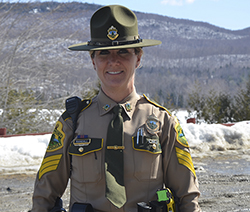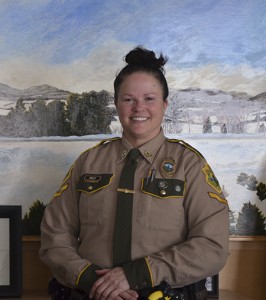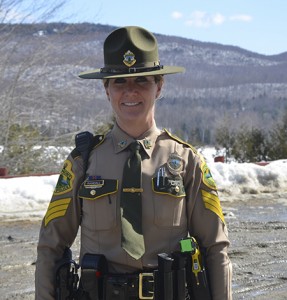

copyright the Chronicle April 8, 2015
by Nathalie Gagnon-Joseph
There’s a growing number of women in law enforcement. In fact, at the moment, six of the 21 State Police officers stationed in the Derby barracks are women. Callie Field, who was originally from Maine, has been working there since 2002. Trooper Field was in law enforcement for seven years before that.
Being a woman in the force is no different from being a man, she said in a recent interview.
“You’re a trooper first and a woman second.”
But in some cases it makes a difference to the public. In domestic violence cases a male attacker may get even more agitated when the law enforcement responder is a woman, Trooper Field said.
Trooper Amy Borsari is also based out of the Derby barracks and works with Trooper Field.
“When we go to a call, I certainly can’t approach a scene like a big guy does, because I’m not,” said Trooper Borsari. She’s five foot two. “You can use your femininity to your advantage.”
She said people react to troopers differently based on their appearance.
“When I walk into a room, or Trooper Field walks into a room, or a guy walks into a room, people read us differently,” she said.
Trooper Borsari has been with the Vermont State Police since 2001.
“You really did feel you were a minority coming on before,” she said.
These days she doesn’t think being a woman on the force is any different from being a guy, especially in Derby, where there are so many women.
“It’s funny because up here it’s just kind of normal,” she said.
But if someone had asked her what it was like to be a woman in law enforcement when she worked in law enforcement in Massachusetts, her answers would have been very different, she said.
Not all female troopers share Trooper Field and Trooper Borsari’s largely discrimination-free experience in Vermont, but many approach their positions in the same way. Ingrid Jonas, who was recently promoted, is the first female captain in the history of the force.
“I just think of myself as a member of the State Police,” she said. “The woman portion of it is de-emphasized. The fact that I’m a woman isn’t part of my day-to-day process. Having said that, it’s an honor to be chosen for this captain’s position.”
Captain Jonas is in charge of recruiting and training in Waterbury. Full-time recruiters reach out to people in high schools and colleges to talk about the work, explain the benefits package and salary, and answer questions about what it’s like to live in Vermont, she said.
“The overall focus is finding the most qualified candidates from the most diverse backgrounds, women, people of color,” Captain Jonas said. “We do some advertising specifically towards those demographics.”
The idea is to get the State Police to better represent the diversity in Vermont’s population, she said. She believes that doing so not only makes the force itself better, but also would greatly contribute to eliminating negative attitudes towards minorities.
“In my 16 plus years in law enforcement I have felt very little hostility in my brothers and sisters from the force, but I have felt that hostility from the public,” Captain Jonas said.
She said she experienced discrimination first-hand many times. A man she was driving to jail called her a “cunt” non-stop for the entire half-hour-long journey, she said.
“It’s disturbing,” she said. “It makes me feel disturbed that society still has members within it that think it’s okay to demean women. This is something women are faced with every day.”
Both male and female troopers deal with insults regularly, but to Captain Jonas, the insults directed at the women in the force are much more crude.
“You hear a male trooper being called a pig, any of these commonly known names, whereas a female is a bitch, c-word, whore,” she said. “They have more hurtful options towards women unfortunately.”

It’s humiliating at first, but it comes with the territory, Captain Jonas said.
“You have your haters and you just drive on. It’s about the person who’s making the comment, so if you take it personally you’re doing yourself a disservice.”
Asked how the problem could be fixed, she said women and men should be on more equal terms in society and there should be strong female role models in the government.
Now Captain Jonas is in a position to become part of that solution.
She was recruited when she was in her late twenties working on domestic violence intervention in Chittenden County. She had a passion for social justice issues and often talked with prosecutors and police officers.
Captain Jonas said she became interested in the possibility of working on social justice from a different vantage point, from within the force.
After speaking to friends and colleagues about her interest, she finally applied and went to the academy when she was selected.
“I don’t think it’s for everybody, but I think making it through that brings about a strong sense of pride and accomplishment.”
To her, the position of women on the force has improved since she started her career.
“We don’t stand out as much,” she said.
As the new staff operations commander, she can make sure women and other minorities increasingly see a career in the State Police as a viable option.
“Making sure that women know there’s room for you here,” she said. “How far do you want to go, basically? I don’t mean women pretending to be men. I mean women being women and being highly impactful troopers.”
Sergeant Teresa Randall, who is based out of the St. Johnsbury barracks, has been a state trooper since 2003.
“I always wanted to be a trooper, or a police officer,” she said. Her father had initially discouraged her from joining up because he was worried about her small size, and the fact that she was a girl.
“I weighed 110 pounds in high school,” she said, laughing.
Back then, she said, there weren’t many women in the force. After a career in publishing, she finally applied to become a Vermont State Police officer, choosing that particular branch of law enforcement because of the opportunities available.
“There’s so much out there for you to do, and promotions,” she said.
Now she can apply the skills she learned in publishing to her job as a state trooper.
“A lot of our job is public relations,” she said.
She is on call 24-7 for the crisis situation negotiation team, and is a supervisor for a mobile traffic safety unit in the north of Vermont.
To contend with potentially aggressive suspects possibly twice her size, she learned “non-lethal use of force” techniques at the academy and continues to train.
Those techniques include maneuvers to control and restrain individuals that all troopers learn.
“Every situation is different,” she said. “That’s why we get training in non-lethal use of force for an arrest.”
Her shift runs from 6 a.m. to 3 p.m., Monday to Friday, but she often stays longer depending on what incidents occur during her shift.
Like Trooper Field, Sergeant Randall has had a positive experience on the force.
“I never felt that I’m looked at differently,” she said as a reporter rode along with her to see what a day for her is like.
She has a laptop in her assigned vehicle and uses it to monitor the incidents where she might be able to help other troopers out.
“If I was in that area, I could respond,” she said when an accident on I-89 came up on her screen. Another trooper was already responding. “There’s always situations where sometimes you could use more help.”
Traffic safety duty involves more than just monitoring traffic though, Sergeant Randall said. She spends a lot of time educating the public about things like car seat safety and training first responders.
Women troopers do all the same jobs as the men on the force, even when they’re pregnant.
“We’ve had female troopers work up to a week before they’re due,” Sergeant Randall said.
The department asks pregnant troopers to advise superiors as early on as possible to facilitate planning. In addition to maternity leave, the trooper’s duties during pregnancy may change to ensure her health and that of her unborn child. Decisions are made on a case-by-case basis, depending on the pregnancy, doctors’ recommendations, and the needs of the department itself.
But that wasn’t always the case. When Sergeant Randall first started working with the State Police, pregnant women in the force would have the same status as someone with an injury, she said. That meant they wouldn’t be allowed to carry a weapon, among other things.
The policy specific to pregnant troopers came into effect in 2006, according to the online policy Sergeant Randall consulted.
Trooper Field served on the committee that wrote that policy and sometimes asked for input from Trooper Borsari, who was pregnant just before the new policy came into effect.
“Erika Lavallee is out,” she said, speaking of another female trooper based in Derby. “She just had a baby, so she gets to benefit from that.”
During Trooper Borsari’s pregnancy, her hours were more regular, and her tasks were less high-risk, working from Monday to Friday on office duty, she said. The current policy prohibits pregnant troopers from fingerprinting and processing people who have been arrested.
When Sergeant Randall joined up, she had already had three children, the youngest of which was five years old. She said having slightly older children and a husband whose job was flexible made the transition easier.
Over the years, there have been many changes in the force to better accommodate its female members. Women can request a female duty belt to better suit the shape of their hips. They also have access to women’s uniforms, but some things remain standard, like guns, pepper spray, Tasers, and handcuffs, Sergeant Randall said.
I didn’t like my first gun because it was too big for my hand, she said. She had to practice to figure out how to hold it and shoot comfortably.
“I think that our department really supports diversity within the State Police,” she said.
Her experience outside of the force hasn’t always been so positive.
“There are times I’ve been called names before, but that’s by men and women,” Sergeant Randall said.
It’s hard to tell if she’s being insulted because she’s a woman or simply because she’s an officer. She remembered one time when a drunken woman spat in her face after getting into a fight.
“I happened to be the one arresting her.”
But Sergeant Randall has also experienced a more respectful reaction from the public.
“I’ve had men apologize for swearing in front of me when I’m arresting them,” she said.
When asked what skills Trooper Borsari thought women brought to the force that perhaps men didn’t, she couldn’t pinpoint any in particular.
“We each have qualities that round out the job for sure,” she said, laughing. “We balance each other out.”
contact Nathalie Gagnon-Joseph at [email protected]
For more free articles from the Chronicle like this one, see our Editor’s Picks pages. For all the Chronicle’s stories, subscribe:
Print subscription
Annual online subscription
Short-term online subscription







